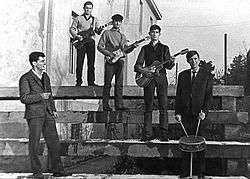Bele Višnje
| Bele Višnje | |
|---|---|
 | |
| Background information | |
| Origin | Čačak, SR Serbia, SFR Yugoslavia |
| Genres | Rock and roll, beat music, rock, folk rock |
| Years active |
1962–1973 (reunions: 1990, 2010) |
| Labels | Diskoton, Zvuci Galaksije |
| Past members |
Aleksandar Slaviković Ljubodrag Jovanović Zoran Sokić Mišo Ilić Dragan Maksimović Slobodan Pajić Muhamed Hukić Stevo Radović Predrag Radonjić Miki Vukadinović Slobodan Rabrenović Jovan Matijašević Vladimir Šunjevarić Dragan Todorović |
Bele Višnje (Serbian Cyrillic: Беле Вишње, trans. White Sour Cherries) was a Serbian and former Yugoslav rock band. The band is notable for being one of the pioneers of the former Yugoslav rock scene.
History
1962-1973
The band was formed in Čačak in the autumn of 1962 by Aleksandar Slaviković "Gušter" (guitar), Ljubodrag Jovanović (bass guitar), Zoran Sokić (keyboards), Mišo Ilić (rhythm guitar), Dragan Maksimović (drums), Slobodan Pajić (vocals) and Muhamed Hukić (vocals).
During 1963 the band started to perform in their most successful lineup which featured Slaviković, Pajić, Hukić, Sokić (who switched to bass guitar), Stevo Radović (rhythm guitar) and Predrag Radonjić (drums). With the arrival of composer Radović, the band started working on their own songs. On the first Belgrade Gitarijada festival, held on 9 January 1966, the band performed first, starting their performance with a cover of the folk song "Crne oči, curo, imaš". On Gitarijada the band won the seventh place, which made possible for them to perform at bigger concerts. In the autumn of 1966, due to their leaving to studies, Sokić and Pajić left the band. During 1966 the band perofrmed the song "Plavokosa" which saw success with the audience. Several years later the song was, under the title "Plavuša", recorded by Kićo Slabinac (who served the army with Radović in Titograd), who achieved nationwide popularity with it. With the new bass guitarist, Miki Vukadinović, Bele Višnje performed on the second Belgrade Gitarijada festival, held on 23 January 1967. The band performed a cover of the Bosnian folk song "Moj dilbere" and the song "Tango" and won the third place. During the following years the band changed the lineup several more times, featuring Slobodan Rabrenović (guitar), Jovan Matijašević (bass guitar), Vladimir Šunjevarić (guitar), Zoran Branković (bass guitar)and Dragan Todorović (guitar and vocals). In 1972 the band recorded their only 7" single, featuring the songs "Čips hit" ("Chips Hit") and "Čarobne oči" ("Magical Eyes"), released through Diskoton,[1] and disbanded the following year.
Reunions
The band reunited in 1990. The lineup featured Vladimir Šunjarević, Stevo Radović, Predrag Radonjić, Slobodan Pajić and Jovan Matijašević. As there were no recordings of the band's songs from the 1960s, in 1994 the band, on the initiative of Radomir Mihajlović Točak, recorded their old songs, released on the audio cassette Pesme naše mladosti (Songs of Our Youth) by Zvuci Galaksije. The album was produced by Mihajlović. In 2005 Pesme naše mladosti was reissued on CD by the same record label.
In November 2010, the band reunited to perform on a celebration of fifty years of rock music in their hometown Čačak.[2]
Discography
Studio albums
- Pesme naše mladosti (1994)
Singles
- "Čips hit" / "Čarobne oči" (1973)
References
- EX YU ROCK enciklopedija 1960-2006, Janjatović Petar; ISBN 978-86-905317-1-4